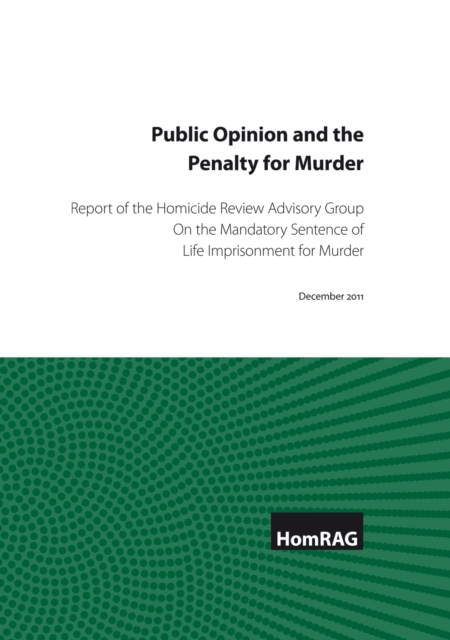
Public Opinion and the Penalty for Murder PDF
by The Homicide Review Advisory Group (HomRAG)
Description
The Homicide Review Advisory Group (HomRAG) was set up in 2004 to run alongside the work of the Law Commission which was reviewing aspects of the Law on murder.
This multidisciplinary group was convened on the initiative of Sir Louis Blom-Cooper QC and Professor Terence Morris; and was initially chaired by the late Very Reverend Colin Slee, Dean of Southwark and now by Sir Louis.
In essence, the group is concerned with promoting a just Law of murder.
As part of this aim and in view of developments in Parliament in late-2011 and continuing into 2012 concerning sentencing and the use of mandatory sentences in particular, HomRAG has published its first report for consideration by Law-makers and other interested parties.
Harking back to the abolition of capital punishment, the group argue that the mandatory life sentence for murder is both unjust and outdated; a compromise arrived at in the 1960s in order to ensure that abolition of the death penalty made its way through both Houses of Parliament.
Neither it nor the present system of tariff-setting allow for sentences which match the seriousness of individual crimes, so that, e.g. a single 'mercy killing' attracts the same penalty as that for a murder which is part of a course of serial killings.
Further, the indefinite and misleading nature of the life sentence - which may or may not involve a life spent in prison - is both unjust and incomprehensible to even better-informed lay people.
Building on modern research which shows that the public and public opinion are nowadays by no means averse to such a change, the report urges that the time has come for a move to fixed sentences for murder as with any other individual crime so that the exact circumstances of offences can be properly reflected by the courts.
Information
-
Download - Immediately Available
- Format:PDF
- Pages:28 pages
- Publisher:Waterside Press
- Publication Date:08/12/2011
- Category:
- ISBN:9781908162106
Information
-
Download - Immediately Available
- Format:PDF
- Pages:28 pages
- Publisher:Waterside Press
- Publication Date:08/12/2011
- Category:
- ISBN:9781908162106






